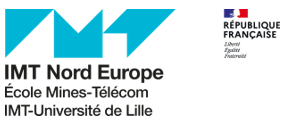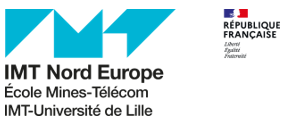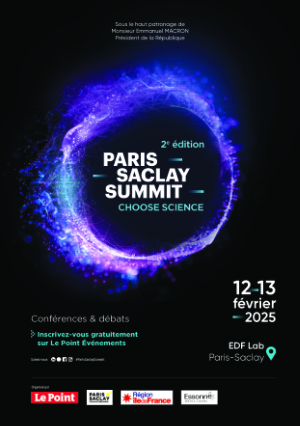Impairment Aware Network Digital Twin: Integration of QKD in optical networks
| ABG-126382 | Master internship | 6 months | 660 € |
| 2024-10-21 |
- Telecommunications
- Computer science
- Engineering sciences
Employer organisation
Télécom Paris and Télécom SudParis are the leading Schools of Engineering in France on the topic of Telecommunications and Networks.
Description
Description
The evolution of Internet depends strongly on the optical network’s ability to handle the challenges of the ever growing traffic, the management of the energy consumption and, but not limited to, the capacity to add on new functionalities without imposing strong changes to the optical infrastructure. The challenges are threefold. First, as always, the users’ ever-increasing capacity needs must be met while simultaneously meeting new requirements, notably curbing the energy consumption’s uncontrolled growth in data center networks, and slashing end-to-end latency by orders of magnitude. Since the numerous required optical-to-electronic conversions are a bottleneck on both issues, optical functionalities (OFs) have been proposed, such as all-optical wavelength conversion or packet switching. However, their decades-old promise to solve these challenges has not materialized outside research labs, because they are too complex to handle from the network’s point of view. This dovetails with the second challenge: handling the complexification of the network due to the emergence of new services such as network slicing and network function virtualization. The commonly accepted answer to the latter is the software-defined network (SDN) ecosystem. However, SDN mostly doesn’t concern itself with the physical layer; even recent control interfaces such as TAPI deal with the feasibility of a data connection between nodes, not the physical impairment details that would be required to manage optical functionalities. And, thirdly, a strong push is underway to integrate quantum key distribution (QKD) into the network as a physics-based security function. QKD, as a class of OFs, is likely to hit the same obstacles that prevented the general deployment of other OFs.
Objectives
Our overall approach is to tackle all three challenges by redefining the abstractions in which networks are expressed. The aim is to accommodate optical network functions, moving away from the classical layered-network model, which cannot accommodate the non-idealities of optical functionalities. As an intermediate step, the development of a “digital twin” (that is, a network simulator that mirrors the physical state of the actual network) would help identify the relevant abstractions as part of the development process, using generic programming techniques to encapsulate optical functions’ non-idealities while making their full benefits available through high-level interfaces likely modeled on the SDN ecosystem. We will start the work by integrating one disruptive function at a time such as QKD.
Work program
Over 6 months, the intern will:
- contribute to an ongoing network simulation development effort, specifically aimed at generic handling of optical functions in a network;
- perform a bibliographical study of the state of the art;
-
propose and test different scenarios to integrate a QKD function in an optical network and evaluate its impact on classical traffic.
The work may lead to a PhD thesis.
Profile
Required skills for the Ph.D. student:
-
Master’s level in either networking or optical communications.
-
Strong knowledge in generic programming techniques, preferably in Python.
- Technical English.
Starting date
Vous avez déjà un compte ?
Nouvel utilisateur ?
Get ABG’s monthly newsletters including news, job offers, grants & fellowships and a selection of relevant events…
Discover our members
 CESI
CESI  MabDesign
MabDesign  PhDOOC
PhDOOC  Institut de Radioprotection et de Sureté Nucléaire - IRSN - Siège
Institut de Radioprotection et de Sureté Nucléaire - IRSN - Siège  ADEME
ADEME  Tecknowmetrix
Tecknowmetrix  TotalEnergies
TotalEnergies  Institut Sup'biotech de Paris
Institut Sup'biotech de Paris  MabDesign
MabDesign  Nokia Bell Labs France
Nokia Bell Labs France  SUEZ
SUEZ  Aérocentre, Pôle d'excellence régional
Aérocentre, Pôle d'excellence régional  ANRT
ANRT  ONERA - The French Aerospace Lab
ONERA - The French Aerospace Lab  CASDEN
CASDEN  Groupe AFNOR - Association française de normalisation
Groupe AFNOR - Association française de normalisation  Généthon
Généthon  Laboratoire National de Métrologie et d'Essais - LNE
Laboratoire National de Métrologie et d'Essais - LNE  Ifremer
Ifremer
-
JobPermanentRef. ABG127643IMT Nord Europe- Les Hauts de France - France

Enseignante Chercheuse ou Enseignant Chercheur (Professeure ou Professeur) en Data/IA
Digital - Data science (storage, security, measurement, analysis) - TelecommunicationsConfirmed -
JobPermanentRef. ABG127640IMT Nord Europe- Les Hauts de France - France

CHARGEE/CHARGE DE RECHERCHE Génie et physique des matériaux polymères
Energy - Materials scienceConfirmed -
JobPermanentRef. ABG125662Association Bernard Gregory (ABG)Paris (3ème) - Ile-de-France - France

Responsable Recrutement, Relations Entreprises et Partenariats
Open to all scientific expertisesAny



